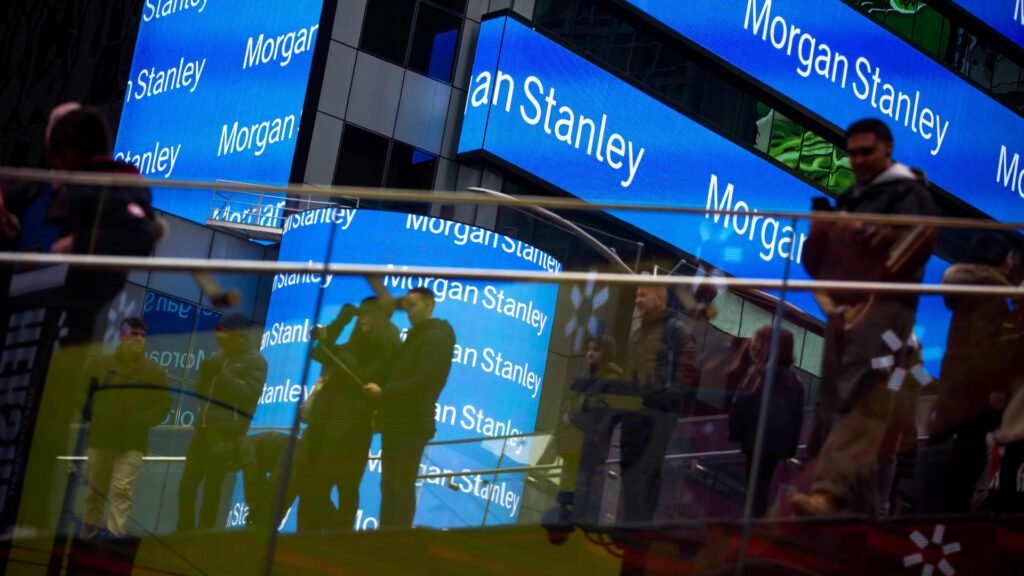A sign hangs outside Morgan Stanley’s headquarters in New York’s Times Square district.
Michael Nagel | Bloomberg | Getty Images
Morgan Stanley is furthering its adoption of artificial intelligence with the introduction of a new assistant that’s expected to save the bank’s financial advisors thousands of work hours.
The assistant, called Debrief, will keep detailed logs of advisors’ meetings and automatically draft emails and summaries of discussions, bank executives told CNBC. Morgan Stanley plans to roll out the program to its roughly 15,000 advisors by early July, marking one of the most significant steps yet for the use of generative AI at a major Wall Street bank.
While the company’s previous efforts have involved creating services like ChatGPT to help advisors navigate the firm’s vast research, Debrief connects AI directly to advisors’ most valuable resource: their relationships with high-net-worth clients.
Built using OpenAI’s GPT-4, the program essentially sits in on Zoom meetings with clients and replaces the handwritten note-taking that advisors and junior colleagues traditionally do, according to Jeff McMillan, Morgan Stanley’s head of enterprise artificial intelligence.
“We’re seeing a huge improvement in the quality and depth of notes taken,” McMillan told CNBC. “The technology actually takes better notes than the average human.”
Consent Required
Importantly, clients must consent to recording each time they use Debrief, and McMillan said future versions will allow advisers to use the program on firm devices during in-person meetings.
The rollout will provide a real-world test of the vaunted productivity gains of generative AI that have taken Wall Street by storm in recent months, boosting the value of chipmakers, tech giants and the overall U.S. stock market.
Morgan Stanley’s wealth management division hosts about 1 million Zoom calls a year, the bank told CNBC. Estimates vary, but one Morgan Stanley adviser involved in the Debrief pilot said the program saves 30 minutes of work per meeting. Advisers typically spend time after meetings creating notes and action plans to address client needs.
Morgan Stanley’s new Debrief program is a new AI tool for wealth management advisors based on OpenAI’s GPT-4.
Provided by: Morgan Stanley
“As a financial advisor, I have four, five, six meetings a day,” said Don Whitehead, a Houston-based advisor who is testing the software. “Having the built-in AI note-taking service really helps me stay engaged in the meetings and actually stay focused a lot longer.”
It remains to be seen what advisers will do with the time freed up from basic, menial tasks. In some ways, Morgan Stanley’s generative AI project amounts to a “grand productivity experiment,” McMillan said.
If, as McMillan and others believe, advisers are able to spend more time serving clients and finding new ones, the technology should help Morgan Stanley grow assets under management and retain both clients and advisers.
Morgan Stanley’s asset management division is one of the world’s largest, with client assets of $5.5 trillion as of March, and the company is aiming to reach $10 trillion.
McMillan said it will take at least a year to determine whether the technology is making advisers more productive.
“I’m an analyst, and advisors tell me they work best when they’re engaged with clients,” McMillan said. “No one will tell you they love taking notes or looking at research reports. That’s not why they got into this job.”
A broader perspective
Morgan Stanley’s vision for AI is to eventually create a layer of technology that allows advisors to seamlessly perform all of their tasks, such as sending proposals, balancing portfolios and generating reports, with simple prompts, Jed Finn, head of wealth management at Morgan Stanley, told investors in February.
McMillan noted that many of the key tasks that will be automated, such as parsing contracts and opening accounts, are common across Morgan Stanley, including its trading and banking divisions.
A recent study found that finance is one of the jobs most likely to be replaced by AI. Citigroup The report said the adoption of AI could boost industry profits by $170 billion by 2028, Citigroup said.
The process is still in its early stages, but McMillan acknowledged that business models are likely to change in ways that are difficult to predict.
“I think there’s going to be some disruption in some areas,” he said. “We’re looking back at all the things that are going to be lost and we don’t know what the future holds.”
Going forward, companies will need millions of prompt engineers to train AI to produce desirable outcomes, McMillan said, noting that it took Morgan Stanley months to fine-tune Debrief’s prompts.
McMillan said he also told his teenage children to consider careers as pronto engineers.
“They’re going to learn how to talk to machines, how to tell machines what to do, how to engage and collaborate with people,” he said. “It’s a whole different ball game than the work we’ve done before.”



